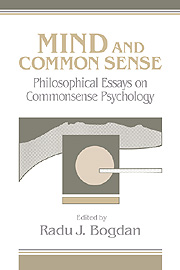Book contents
- Frontmatter
- Contents
- List of Contributors
- 1 The Folklore of the Mind
- 2 Analysis without Noise
- 3 Folk Psychology and the Explanation of Human Behavior
- 4 Methodological Reflections on Belief
- 5 Consciousness and Content
- 6 The Inevitability of Folk Psychology
- 7 How is Eliminative Materialism Possible?
- 8 The Long Past and the Short History
- 9 Common Sense Naturalized: The Practical Stance
- Index
2 - Analysis without Noise
Published online by Cambridge University Press: 24 September 2009
- Frontmatter
- Contents
- List of Contributors
- 1 The Folklore of the Mind
- 2 Analysis without Noise
- 3 Folk Psychology and the Explanation of Human Behavior
- 4 Methodological Reflections on Belief
- 5 Consciousness and Content
- 6 The Inevitability of Folk Psychology
- 7 How is Eliminative Materialism Possible?
- 8 The Long Past and the Short History
- 9 Common Sense Naturalized: The Practical Stance
- Index
Summary
Folk Psychology and Conceptual Analysis
This paper will present some conceptual analysis, trying to command a clearer picture of how our mentalistic concepts work. I mean our untutored, workaday concepts, the ones that we employ in folk psychology. Many students of the mind these days are poised to jettison folk psychology as soon as they can, in favor of something better informed, more comprehensive, more closely in touch with the central nervous system, or the like. But given that folk psychology, whatever its defects, is not on a par with alchemy or astrology, we oughtn't to drop it until we understand more than we do about what kind of theory it is, what work it does, and how. That's one reason why even the iconoclasts should be interested in that part of the philosophy of mind that consists in old-fashioned conceptual analysis. A second reason also weighs with me: Folk psychology is a wonderful intellectual construct, an amazing tool for enabling us to get on with one another, to manipulate and predict one another, and to evade and foil such manipulations and predictions; it is an inherently worthy object of study.
The network of concepts that we use in folk psychology pretty well exhausts its content, considered as a compendium of general propositions: It is hard to find much universally received general doctrine about the human mind that doesn't qualify as highly analytic.
- Type
- Chapter
- Information
- Mind and Common SensePhilosophical Essays on Common Sense Psychology, pp. 15 - 36Publisher: Cambridge University PressPrint publication year: 1991
- 1
- Cited by



